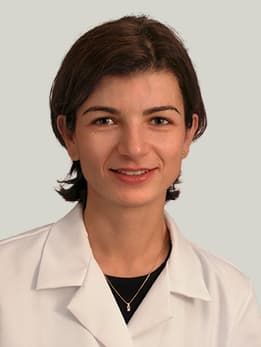Getting more sleep reduces caloric intake, a game changer for weight loss programs

Understanding the underlying causes of obesity and how to prevent it is the best way to fight the obesity epidemic, according to Esra Tasali, MD, Director of the UChicago Sleep Center at the University of Chicago Medicine. “The current obesity epidemic, according to experts, is mostly explained by an increase in caloric intake, rather than lack of exercise,” she said.
However, a study on how getting sufficient sleep affects caloric intake in a real-world setting could change how we think about weight loss.
In a randomized clinical trial with 80 adults, published February 7, 2022 in JAMA Internal Medicine, Tasali and her colleagues at UChicago and the University of Wisconsin–Madison found that young, overweight adults who habitually slept fewer than 6.5 hours a night were able to increase their sleep duration by an average of 1.2 hours per night after a personalized sleep hygiene counseling session. The sleep intervention was intended to extend time in bed duration to 8.5 hours — and the increased sleep duration compared to controls also reduced participants’ overall caloric intake by an average of 270 kcal (calories) per day.
“Over the years, we and others have shown that sleep restriction has an effect on appetite regulation that leads to increased food intake, and thus puts you at risk for weight gain over time,” said Tasali. “More recently, the question that everyone was asking was, ‘Well, if this is what happens with sleep loss, can we extend sleep and reverse some of these adverse outcomes?”
The study not only examines the effects of sleep extension on caloric intake but, importantly, does so in a real-world setting, with no manipulation or control over participants’ dietary habits. Participants slept in their own beds, tracked their sleep with wearable devices, and otherwise followed their normal lifestyle without any instructions on diet or exercise.
“Most other studies on this topic in labs are short-lived, for a couple of days, and food intake is measured by how much participants consume from an offered diet,” said Tasali. “In our study, we only manipulated sleep, and had the participants eat whatever they wanted, with no food logging or anything else to track their nutrition by themselves.”
Instead, to objectively track participants' caloric intake, investigators relied on the "doubly labeled water" method and change in energy stores. This urine-based test involves a person drinking water in which both the hydrogen and oxygen atoms have been replaced with less common, but naturally occurring, stable isotopes that are easy to trace. The use of this technique in humans was pioneered by the study’s senior author Dale A. Schoeller, PhD, Professor Emeritus of Nutritional Sciences at UW–Madison. “This is considered the gold standard for objectively measuring daily energy expenditure in a non-laboratory, real-world setting and it has changed the way human obesity is studied,” said Schoeller.
Overall, individuals who increased their sleep duration were able to reduce their caloric intake by an average of 270 kcal per day – which would translate to roughly 12 kg, or 26 lbs., of weight loss over three years if the effects were maintained over a long term.
Perhaps the most surprising aspect of the study was the intervention’s simplicity. “We saw that after just a single sleep counseling session, participants could change their bedtime habits enough to lead to an increase in sleep duration,” said Tasali. “We simply coached each individual on good sleep hygiene, and discussed their own personal sleep environments, providing tailored advice on changes they could make to improve their sleep duration. Importantly, to blind participants to sleep intervention, recruitment materials did not mention sleep intervention, allowing us to capture true habitual sleep patterns at baseline.”
Even though the study did not systematically assess factors that may have influenced sleep behavior, “limiting the use of electronic devices before bedtime appeared as a key intervention,” said Tasali.
Following just a single counseling session, participants increased their average sleep duration by over an hour a night. Despite prescribing no other lifestyle changes, most participants had a large decrease in how much they ate, with some participants eating as many as 500 fewer calories per day.
The subjects were only involved in the study for a total of four weeks, with two weeks for gathering baseline information about sleep and caloric intake, followed by two weeks to monitor the effects of the sleep intervention.
“This was not a weight-loss study,” said Tasali. “But even within just two weeks, we have quantified evidence showing a decrease in caloric intake and a negative energy balance — caloric intake is less than calories burned. If healthy sleep habits are maintained over longer duration, this would lead to clinically important weight loss over time. Many people are working hard to find ways to decrease their caloric intake to lose weight — well, just by sleeping more, you may be able to reduce it substantially.”
Ultimately, Tasali and her team hope to examine the underlying mechanisms that may explain these results, and believe this work should spur new, larger studies on weight control to determine if extending sleep can support weight-loss programs and help prevent or reverse obesity.
“In our earlier work, we understood that sleep is important for appetite regulation,” said Tasali. “Now we’ve shown that in real life, without making any other lifestyle changes, you can extend your sleep and eat fewer calories. This could really help people trying to lose weight.”
The study, “Effect of Sleep Extension on Objectively Assessed Energy Intake Among Adults with Overweight in Real-Life Settings,” was supported by the National Institutes of Health and the Diabetes Research and Training Center at UChicago (R01DK100426, CTSA-UL1 TR0002389, and ULTR002389). Additional authors include Kristen Wroblewski, Eva Kahn, and Jennifer Kilkus of UChicago and Dale A. Schoeller of the University of Wisconsin–Madison.

Esra Tasali, MD
Esra Tasali, MD, is interested in the links between sleep and metabolic, endocrine and cardiovascular functions. She is an expert in sleep disorders with a specific interest in sleep-disordered breathing.
View Dr. Tasali's physician bio